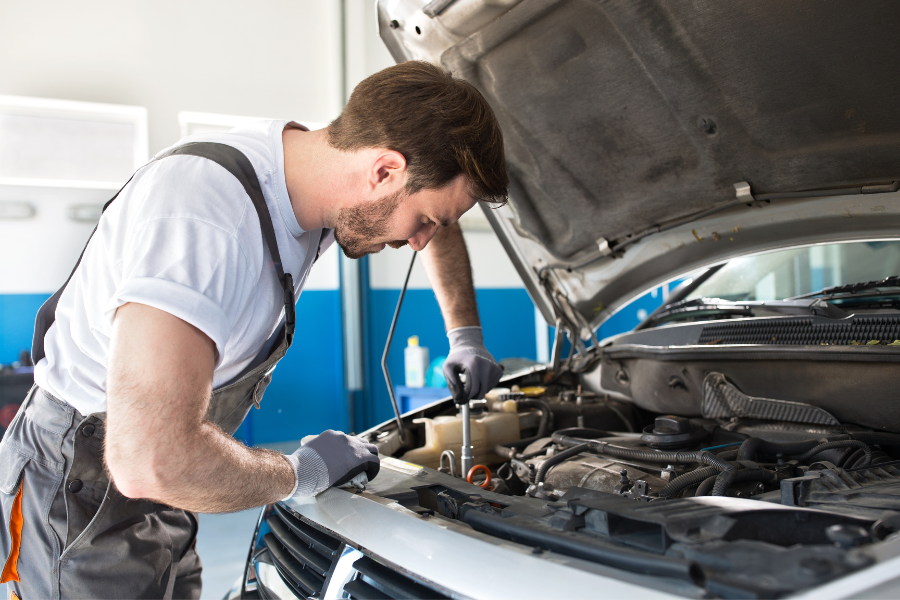Like most people, you probably don’t think about your car’s engine until there’s a problem. By then, it may be too late. Engine problems can be costly to repair, so you can save money when you preserve your car engine. Also, it can counter the inconvenience of being without a car.
This post will discuss five ways to preserve your car engine and keep it in good condition for years to come!
Jump to:
Spark Plug Service
Check Your Oil Regularly
Change Your Air Filter Often
Keep Your Car Engine Clean
Know How to Fix Common Problems
Conclusion
1. Spark Plug Service
One of the simplest and most effective ways to keep your car engine in good condition is to service your spark plugs regularly. Spark plugs are responsible for igniting the fuel in your car’s motor, so they must be in good working order.
If you neglect to service your spark plugs, they can become damaged, leading to engine problems.
You can avoid these problems by having your spark plugs serviced according to your car’s service schedule. You may also consider replacing them more often if you drive in dusty or dirty conditions.
Here are four ways to keep your spark plugs in tip-top condition:
-
Clean surrounding areas before removing
Dirt and debris could be settling near the exterior of your spark plugs. Be sure to clean this area before removing them to avoid contaminants entering the cylinder bore, a part where the piston moves up and down.
Use a washer-style gasket if you notice the spark plug doesn’t have a tapered seat. In securing the spark plug into the washer-style gasket, you should never overtighten it. Too much torque can cause the gasket to break and allow oil or fuel to leak into the combustion chamber.
-
Use an anti-seize compound on the threads
If you’re reusing spark plugs, apply an anti-seize compound on the threads, and it will help prevent them from seizing in the cylinder head and making removal difficult.
-
Do not use an impact wrench
An impact wrench can easily damage the spark plug, so it’s best to avoid using one altogether. Instead, use a ratchet or socket to loosen and remove spark plugs.
-
Do not use a power washer
A power washer can damage delicate parts of the engine. If you must wash your car’s motor, do so by hand with a gentle cleaning solution.
Following these steps can help you preserve your car engine.
2. Check Your Oil Regularly
Another way to preserve your car engine is to check your oil regularly. Over time, your engine oil will become dirty and contaminated with debris, leading to sludge build-up, which can clog your engine and cause problems.
To avoid this, check your oil level regularly and change it according to your car’s service schedule. You may also want to consider using a higher-quality oil to help extend your engine’s life.
Here are some indicators showing your car needs an oil change ASAP:
-
The oil change indicator on your dashboard lights up.
If you notice the oil change indicator light on your dashboard, it’s time to look under the bonnet. Find the engine oil reservoir and take out the dipstick. If the oil level is below the minimum mark, it’s time to change.
-
The engine oil looks dirty.
When you check your engine oil, it should be light brown or amber. If it’s black and gritty, it’s time for a change. Pushing your car to run using dirty oil could result in severe engine damage.
-
You hear unusual knocking noises.
If you notice your car’s engine making knocking or ticking noises, this could be an indication that the oil is dirty and needs to be changed. Be sure to have it checked by a professional as soon as possible.
-
Exhaust fumes turn smokey.
Exhaust fumes are usually translucent and shouldn’t be emitting any smoke. If you notice your car’s exhaust turning blue or black, this is an indication that the oil needs to be changed.
One of the best ways to preserve your car engine is to have it regularly serviced and maintained. It will help keep it in good condition and prevent significant problems from developing.
Take your car to a mechanic for regular servicing. Or better yet, get a mobile mechanic to come to you.
3. Change Your Air Filter Often
Your car air filters act as a ‘barrier’ between the outside air and your car engine. Over time, they will become clogged with dirt, dust, and other debris. That reduces the airflow to your car’s motor, resulting in overheating.
Worn-out or damaged air filters can also lead to engine damage. You can avoid this by having a trusted car mechanic check the air filters and replace them as necessary.
You can assess whether your air filter is functioning or not by observing the following signs:
-
Lower fuel mileage.
If you notice your car’s fuel economy has decreased, the air filter could be clogged. That causes the engine to work harder and use more fuel.
-
The engine ‘chokes’ or idles roughly.
A blocked air filter can restrict airflow to the engine, causing it to choke or idle roughly.
-
Car sluggishly rolls over when ignited.
When you turn on the ignition, your car’s engine might take longer to start up. In turn, it may prevent the spark plug from igniting the fuel-air mixture and cause the engine to stall.
A telltale sign that your car’s air filter needs to be changed is when you see debris or dirt on it. If it’s been a while since you last replaced your air filter, it’s best to have it checked by a professional.
-
Car mileage reaches about 12,000 to 15,000 km.
Depending on the make and model of your car, you need to replace the air filter every 12,000 to 15,000 km. It will help keep your car engine running smoothly and prevent any problems from developing. To be sure, check your owner’s manual and see the ideal duration for air filter replacements.
4. Keep Your Car Engine Clean
One of the best ways to keep your car engine in good condition is to clean it regularly. It will help remove any build-up of dirt, dust, and debris that can cause problems.
You can clean your car engine by following these simple steps:
-
Turn off the engine and let it cool
Before you start cleaning, it’s essential to turn off the engine and let it cool. Never clean the motor while it’s still turned on or hot.
-
Remove the negative battery terminal
It will help to prevent any electrical shorts while you’re cleaning.
-
Dilute a degreaser with water
To remove any grease or oil build-up, dilute a degreaser with water and spray it onto the engine.
-
Allow the degreaser to sit for a few minutes
A degreaser will help loosen any dirt, dust, and debris build-up.
-
Scrub the engine with a brush
After a few minutes, use a brush to scrub the engine and remove any stubborn dirt.
-
Rinse the engine with water
After scrubbing, rinse the engine off with water to remove any residual degreaser.
-
Dry the engine with a clean cloth
Be sure to dry the engine entirely before putting everything back in place. Then reattach the negative battery terminal to complete the cleaning process.
-
Regular servicing and maintenance
Asking a certified car mechanic will help identify issues early on and prevent them from developing into more significant problems. When you come in to have your engine oil changed, you can also ask them about the condition of your car engine.
5. Know How to Fix Common Problems
A compromised engine can cause many problems, so it’s essential to know how to fix common issues. Being proactive and learning how to fix minor problems can save you time and money in the long run.
Here are some common car engine problems and how to fix them:
-
Engine overheating
If your engine is overheating, it’s crucial to take action immediately. Overheating can cause severe damage to the engine, so it’s best to avoid driving if possible. If you must go, keep the engine speed low and turn on the heater to help dissipate heat.
Once you’re safely off the road, please turn off the engine and let it cool down. Then check the coolant level and add more if necessary. If the problem persists, it’s best to call a tow truck or a trusted mechanic such as Tunemaster.
-
Engine oil leak
If you notice an oil leak, taking immediate action is vital. First, check the oil level and add more if necessary. If the leak is severe, it’s best to call a professional to check your car to prevent further damage.
-
The car won’t start
If your car won’t start, the first thing you should do is check the battery. A dead battery will require you to jump-start the vehicle or have it replaced. However, if the battery is working, there could be an issue with the starter or ignition system.
If you notice any strange noises or smells coming from your car, it’s best to have it checked by a professional. These could be signs that something is wrong with the engine and should be looked at as soon as possible.
Conclusion
There are many ways to preserve your car engine and extend its lifespan. By being proactive and taking care of your car, you can avoid expensive repairs and keep your vehicle running smoothly for years to come.
Having a reliable car mechanic and servicing could save you time, money and hassle in the long run. If you’re unsure how to fix a problem, it’s always best to ask a professional for help.
Tunemaster Mobile Automotive Services has over 30 years of experience in the industry. As mobile mechanics, we come to you, so you don’t have to stress about getting to a mechanic. We ensure your car is in top condition, keeping you and your loved ones safe on the roads.

